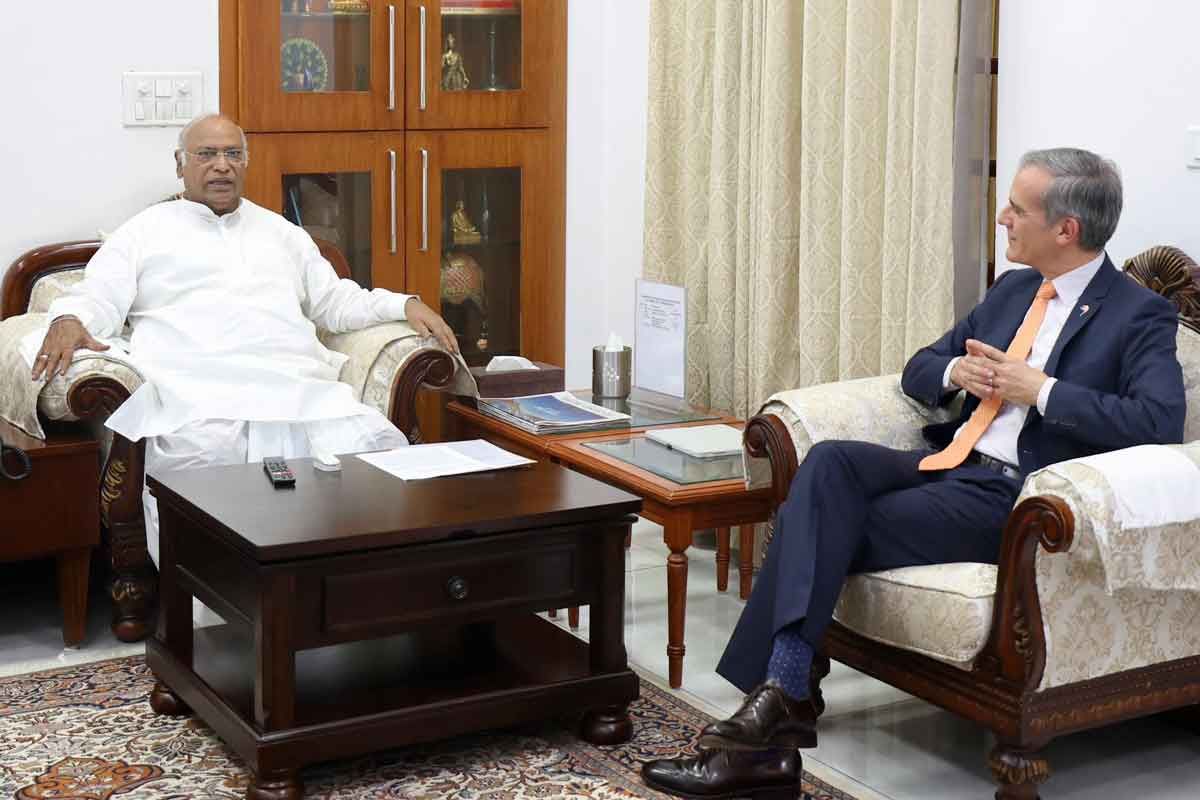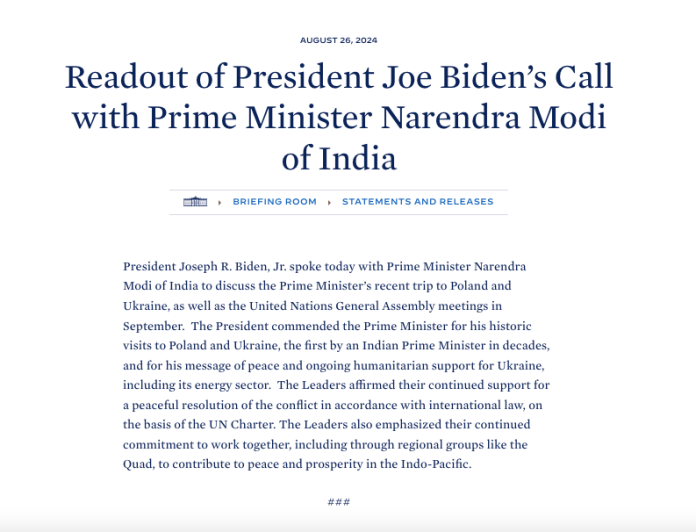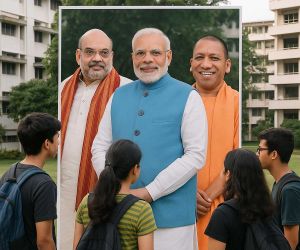MORE COVERAGE
Twitter Coverage
Satyaagrah
Written on
Satyaagrah
Written on
Satyaagrah
Written on
Satyaagrah
Written on
Satyaagrah
Written on
JOIN SATYAAGRAH SOCIAL MEDIA
"बने चाहे दुश्मन ज़माना हमारा": US diplomats engage with Indian opposition leaders like Kharge, Owaisi and Omar Abdullah, raising alarms of interference similar to political dynamics in Bangladesh, as Jammu and Kashmir braces for pivotal Assembly Elections

On September 3rd, US Ambassador to India, Eric Garcetti, had a notable meeting with Congress president Mallikarjun Kharge at his residence. The central topic of discussion was the ongoing efforts to further strengthen the bilateral relationship between India and the United States, with both parties emphasizing the importance of this strategic partnership. The meeting was positioned as part of a larger narrative surrounding the ever-evolving relationship between the two nations, rooted in shared democratic values.
Mallikarjun Kharge took to social media platform X to share his sentiments on the meeting, posting images alongside Garcetti. Kharge stated: "India and the United States enjoy a comprehensive global strategic partnership covering almost all areas of human endeavour, driven by shared democratic values. Delighted to meet Ambassador of the US to India, HE Mr. Eric Garcetti, Minister-Counselor of Political Affairs, Mr. Graham Mayer, and Chief of Staff, Ms. Lisa Brown and discussed deepening of ties between the two countries."
This meeting between Kharge and Garcetti is particularly striking given the timing. Just days prior, US diplomats had engaged in discussions with opposition leaders from the National Conference in Jammu and Kashmir, ahead of the state’s upcoming Assembly Elections. These recurrent interactions between US diplomats and prominent Indian opposition figures have sparked growing concerns about potential US involvement in India’s internal democratic processes.
|
The issue becomes more pronounced when considering the sequence of meetings. Leading up to the crucial Jammu and Kashmir elections, US diplomats, including Minister-Counsellor for Political Affairs Graham Mayer and First Secretary Gary Applegarth, held discussions with Omar Abdullah, the National Conference’s Vice President. The meeting took place at Abdullah’s residence on Gupkar Road, Srinagar. During this conversation, a broad spectrum of issues was reportedly addressed, all relating to the sensitive geopolitical landscape of Jammu and Kashmir.
Further adding to the suspicion surrounding US diplomatic engagements, just last month, Jennifer Larson, the US Consul General in Hyderabad, met with AIMIM leader Asaduddin Owaisi and Telangana’s Chief Minister, Revanth Reddy. These back-to-back meetings with key opposition figures raise serious questions about whether the US is attempting to sway the political dynamics in India ahead of crucial elections.
The timing and frequency of these diplomatic exchanges leave little doubt about the motivations behind them. The opposition leaders' eager involvement with US diplomats, just before major elections, could be perceived as an unwelcome interference in India’s democratic processes. As the situation develops, many are beginning to question the true nature of these meetings, suspecting that the US might be trying to manipulate the Indian political landscape to serve its own strategic interests.
By continuing this trend of engagement with opposition figures, the US seems to be stepping into dangerous territory, raising concerns about foreign influence in Indian elections. With elections on the horizon, the motives behind these meetings deserve close scrutiny, especially as the US diplomats appear to be handpicking influential leaders across the opposition spectrum.
As Modi and Biden talk, fears grow around US interfering in Indian democracy: How US diplomats are meeting opposition from Gupkar gang, Owaisi to ‘farmer leaders’
On August 26th, a significant conversation took place between Prime Minister Narendra Modi and US President Joe Biden. This discussion covered a wide range of important topics. Interestingly, just hours before this high-level dialogue, US diplomats were reported to have met with leaders of the National Conference in Jammu and Kashmir, with the Assembly Elections just around the corner. This is not an isolated incident; there has been a noticeable increase in meetings between US diplomats and various factions of the Indian opposition. These encounters are becoming more frequent and are stirring concerns about potential US interference in the internal democratic processes of India.
Adding another layer to these concerns, there have been instances reported where US diplomats engaged with leaders of the protesting farmer groups in India. This has been interpreted by many as a direct involvement in India's domestic issues, further complicating the diplomatic relations between the two countries.
|
According to the official press release from the Ministry of External Affairs, Government of India, during their conversation, Prime Minister Modi expressed his gratitude towards President Biden for his profound dedication to the India-US Comprehensive Global Strategic Partnership. This partnership is anchored in mutual democratic values, the rule of law, and robust people-to-people ties. "They reviewed the significant progress in bilateral relations and highlighted that the India-US partnership is aimed at benefiting the people of both countries as well as the entire humanity. They also talked in detail on a number of regional and global issues. During the discussion, they talked about the situation in Ukraine and PM briefed President Biden about his recent visit to Ukraine. Furthermore, they discussed the situation in Bangladesh and emphasised restoration of law and order and ensuring safety and security of the minorities, particularly Hindus."
|
 |
Interestingly, the press release from the White House presented a different narrative. It did not mention any discussions about Bangladesh or the situation concerning Hindus in that region. The White House statement focused instead on the discussions around Prime Minister Modi's trips to Poland and Ukraine and the upcoming United Nations General Assembly meetings in September. The statement read: "President Joseph R. Biden, Jr. spoke today with Prime Minister Narendra Modi of India to discuss the Prime Minister’s recent trip to Poland and Ukraine, as well as the United Nations General Assembly meetings in September. The President commended the Prime Minister for his historic visits to Poland and Ukraine, the first by an Indian Prime Minister in decades, and for his message of peace and ongoing humanitarian support for Ukraine, including its energy sector. The Leaders affirmed their continued support for a peaceful resolution of the conflict in accordance with international law, on the basis of the UN Charter. The Leaders also emphasized their continued commitment to work together, including through regional groups like the Quad, to contribute to peace and prosperity in the Indo-Pacific."
The discrepancy in the press releases raises questions about the selective coverage and possible agendas behind the narratives being promoted by both countries.
US Diplomats met NC leaders in Jammu and Kashmir
As the Assembly Elections in Jammu and Kashmir draw near, the interactions between United States diplomats and Indian political leaders have intensified. Notably, Minister-Counsellor for Political Affairs Graham Mayer and First Secretary Gary Applegarth met with Omar Abdullah, the Vice President of the National Conference. This meeting, held at Abdullah's Gupkar Road residence in Srinagar, covered a broad spectrum of topics related to the state of Jammu and Kashmir and its broader geopolitical implications.
During the discussion, Omar Abdullah highlighted significant changes in the region, specifically pointing out the easing of previously stringent travel advisories. According to a report by ANI, Abdullah advocated for a reevaluation of these advisories, suggesting that the improved conditions should be communicated globally to encourage tourism. "Abdullah emphasised the need to reconsider the travel advisories for Jammu and Kashmir, noting that restrictions in the region have been eased. He also encouraged foreign tourists to visit Jammu and Kashmir to experience the culture and beauty firsthand."
|
In conversations with the media, Tanvir Sadiq, the National Conference’s Chief Spokesperson and Head of Communications, reiterated the extensive nature of the discussions, which addressed various aspects of Jammu and Kashmir's current situation and its future. Sadiq mentioned that Political Counsellor Abhiram was also part of the US delegation, indicating the significance of the meeting.
From the National Conference’s perspective, senior leader and Member of Parliament Ruhullah Mehdi's presence underscored the importance of these discussions. Reflecting a strategic outreach effort, the National Conference shared via X (formerly Twitter) that Abdullah extended an invitation to the US diplomats and their families to visit Kashmir. This gesture aimed to foster international goodwill and boost confidence among potential tourists from the US and elsewhere regarding the safety and hospitality of Kashmir.
The party’s official statement captured the essence of these interactions: "Discussions covered a wide range of issues pertaining to Jammu and Kashmir and the region in general. Omar Abdullah emphasised to the diplomats the importance of reconsidering the travel advisories for Jammu and Kashmir with a view to easing the restrictions. He encouraged people from around the world to visit Kashmir and experience its beauty and culture firsthand. He also invited the diplomats to visit Kashmir with their families as a first step to inspire confidence among tourists from the United States and other parts of the world."
US Diplomats Met Indian Opposition Leaders
The engagement of US diplomats with various leaders of the Indian opposition throughout August paints a complex picture of international diplomacy and its potential implications on domestic politics. These meetings, while ostensibly cordial and part of regular diplomatic outreach, have occurred with notable frequency and strategic timing, especially considering the political contexts of the regions involved.
On August 14th, Sputnik India reported on these interactions, emphasizing the involvement of Jennifer Larson, the US Consul General in Hyderabad, who met with several key political figures. Larson’s meeting with Asaduddin Owaisi, the chief of All India Majlis-e-Ittehadul Muslimeen (AIMIM), was publicly acknowledged on the social media platform X. Larson expressed her gratitude and anticipation for continued dialogue, writing: "Thank you, Member of Parliament and leader of AIMIM Asaduddin Owaisi for your kind hospitality and for sharing your informed and important views on a range of shared issues and concerns. I look forward to continuing our discussions!"
|
Additionally, Larson met with N. Chandrababu Naidu, the Chief Minister of Andhra Pradesh. Her posts on X highlighted the diplomatic and strategic interests of the United States in fostering relations with Andhra Pradesh, particularly in fields like trade, technology, and education. Larson noted: "It was an honor to meet Andhra Pradesh Chief Minister Nara Chandrababu Naidu today. I very much admire his vision for the state, and fully agree with him that the United States and Andhra Pradesh must continue to work together in such important fields as trade, technology, education, and strengthening broader people-to-people ties."
|
Her interactions extended to Revanth Reddy, the Chief Minister of Telangana, with discussions focusing on attracting new investments to the region. Larson's remarks reflect the deep economic ties and potential for further cooperation between Hyderabad and U.S. businesses. She stated: "I had an excellent meeting today with Telangana Chief Minister Revanth Reddy on the eve of his departure to the United States to mobilize new investments. Hyderabad hosts close to 200 U.S. companies and continues to absorb more and more in several high-end tech sectors such as AI, contributing to the success story of U.S.-India trade buoyancy. I wished CM Reddy much success in his efforts and promised to extend our cooperation!"
|
Earlier interactions in July also saw Larson engaging in cultural diplomacy, as highlighted during the completion ceremony of the Qutb Shahi Heritage Park. She celebrated the role of the US Consulate General in Hyderabad in restoring historic monuments, reinforcing cultural connections. Larson expressed pride in these collaborations, stating: "So wonderful to join the Telangana Chief Minister Revanth Reddy, Tourism and Culture Minister Jupally Krishna Rao, Hyderabad Member of Parliament Asaduddin Owaisi, and Prince Rahim Aga Khan in the completion ceremony of Qutb Shahi Heritage Park today, and so proud that US Consulate General Hyderabad played a supporting role in the restoration of these beautiful, historic monuments of Hyderabad. It speaks to the deepening U.S.-Telangana cultural ties throughout the years!"
|
Fear of US meddling in India’s affairs
The sequence of recent meetings between US diplomats and Indian opposition leaders has intensified concerns over possible American interference in India's internal politics. These concerns are particularly acute in light of the forthcoming Jammu and Kashmir Assembly Elections. Drawing parallels to past international incidents, similar accusations have surfaced regarding US activities in Bangladesh. Allegedly, USAID along with other foreign entities were implicated in attempts to destabilize Sheikh Hasina's government.
Further accusations suggest that the US has supported resistance movements against Hasina, contributing to heightened tensions and unrest within Bangladesh. This pattern of behavior points to a broader strategy where the US may leverage its diplomatic influence to sway the local politics of sovereign nations.
Given this backdrop, the engagements between US diplomats and Indian opposition figures ahead of critical elections in a geopolitically sensitive region like Jammu and Kashmir are viewed with suspicion. The potential for these interactions to adversely affect the region's political and social stability is a source of significant concern for those wary of external influences on India’s sovereign affairs.
Jammu and Kashmir Assembly Elections
The upcoming Assembly Elections in Jammu and Kashmir are scheduled to unfold in three phases, reflecting the region's complex political landscape. The first phase of voting is set for September 18th, followed by the second on September 25th, and the third on October 1st. The results of these pivotal elections will be tallied on October 4th.
Amidst heightened security, the campaign trail is heating up, with various parties outlining their strategies and finalizing candidate selections. Reportedly, an electoral arrangement between Congress and the National Conference has been established, dividing the seat share for optimal coverage and influence. Out of the total 90 seats, the National Conference will contest 51, whereas Congress will vie for 32 seats. Additionally, a "friendly" contest is arranged for five seats, fostering a competitive yet cooperative political environment. The CPI(M) and Panthers Party have been allocated one seat each. Meanwhile, the Bharatiya Janata Party (BJP) has so far announced its candidacy for 16 seats.
This strategic seat distribution and the phased electoral process underscore the critical nature of these elections, not only for the parties involved but also for the overall stability and political future of Jammu and Kashmir. With the US's recent diplomatic engagements with key opposition figures, the scrutiny of international involvement is likely to remain a contentious issue as the region heads to the polls.
 Support Us
Support Us
Satyagraha was born from the heart of our land, with an undying aim to unveil the true essence of Bharat. It seeks to illuminate the hidden tales of our valiant freedom fighters and the rich chronicles that haven't yet sung their complete melody in the mainstream.
While platforms like NDTV and 'The Wire' effortlessly garner funds under the banner of safeguarding democracy, we at Satyagraha walk a different path. Our strength and resonance come from you. In this journey to weave a stronger Bharat, every little contribution amplifies our voice. Let's come together, contribute as you can, and champion the true spirit of our nation.
 |  |  |
| ICICI Bank of Satyaagrah | Razorpay Bank of Satyaagrah | PayPal Bank of Satyaagrah - For International Payments |
If all above doesn't work, then try the LINK below:
Please share the article on other platforms
DISCLAIMER: The author is solely responsible for the views expressed in this article. The author carries the responsibility for citing and/or licensing of images utilized within the text. The website also frequently uses non-commercial images for representational purposes only in line with the article. We are not responsible for the authenticity of such images. If some images have a copyright issue, we request the person/entity to contact us at This email address is being protected from spambots. You need JavaScript enabled to view it. and we will take the necessary actions to resolve the issue.
Related Articles
- "True art awakens the Extraordinary Ovation": 15 standing ovations, 79 applauses, autographs, selfies, and the whole house echoing with ‘Modi Modi slogans, Prime Minister Modi's joint address to the US Congress resonated as a resounding success
- If Modi’s ‘Vaccine Diplomacy’ wrong, Sonia Gandhi’s ‘Eurozone Bailout’ wrong
- Gujaratis are agitated and are taking PM Modi’s security breach in Congress-ruled Punjab personally: In their hearts, Modi is still ‘their man’
- "BJP has spread kerosene all over the country. You need one spark and we'll be in big trouble": A Criminal psychology study of Rahul Gandhi statement using Kerosene and link of "SAFFRON TERROR” word coined by that time ISI chief
- Golden time of Nehru dynasty, when assets of country like Indian Navy were used for Vacation and to 'pay respect' to Edwina Mountbatten's death
- Anything atrocious and we have Hindu identity to merit, but for the good, we have a tough choice: Mughals, British, or Nehru
- "Who gifted 163-acre Katchatheevu Island to Sri Lanka as a gift, wasn’t that part of Maa Bharati there," PM Narendra Modi tore Congress while replying at the No-Confidence Motion, highlighting DMK and CM Stalin consistent pleas urging its retrieval
- Questioning the very idea of India as a ‘nation’, stoking sub-nationalism, and launching a tirade against the Modi government – Shehjada Rahul Gandhi’s new playbook of polarisation
- Congress Govt in Rajasthan has erased evidence from the spot where the specially-abled minor girl was found abandoned at Tijara flyover in Alwar: NCW chief says FIR should be lodged against Rajasthan govt
- Most vocal of G23 leaders against Gandhi family, Senior Congress leader Kapil Sibal quits Congress party, runs for Rajya Sabha seat supported by Samajwadi Party: Recently represented Azam Khan in Supreme Court
- While criticizing Modi govt's approach to the Women’s Reservation Bill, Rahul Gandhi once again seems to belittle Hindus by suggesting their temple Murthis lack genuine power, raising questions on his repeated insensitivity towards Hindu sentiments
- Three generations of Nehru-Gandhi dynasty has visited Babur’s tomb in Afghanistan: Did you know?
- "If saving money is wrong, I don't want to be right!": Central Vista to save the govt around Rs 1000 crore per annum in rent and other associated costs, still faced opposition from political parties, environmental activists and civil society organizations
- Farmers gathered outside the residence of CM Ashok Gehlot and protested as banks are auctioning the agricultural land of farmers on failure to repay loans despite Rahul Gandhi’s tall promises: ‘Congress has ruined our lives'
- Manmohan Singh govt was ready to demilitarise the Siachen glacier and cede the control to Pakistan under the pressure of Americans, wanted to call it ‘Mountain of Peace’: Former Chief of Army Staff General JJ Singh

























